#1) the concept is good! it's really good! i love stories that explore the effects of abuse and terrible experiences
Text
I keep thinking of this interpretation of N!Hector (at the bottom). How, essentially, his growth revolved around his conception of love: how he's at his core a broken, love-starved man who had to learn how to let go out of selflessness.
They make some valid points. So I want to put together why the story still wastes a very intriguing concept and its morals are still disgusting.
Let's take N!Hector purely from this angle. His sloppy writing starts to make sense. N!Hector never warms up to Carmilla, because his last memory of Carmilla is her beating him up after she revealed that her apparent respect was a lie. Dracula is on thin ice: he was the first person who was nice to him, but he lied to N!Hector about his real plans, and most importantly, got convinced that he might have died if Dracula actually succeeded. (still doesn't stop him from wanting to resurrect him)
Lenore is "nice" to him. Lenore not only praised his voice, the strength of his character, etc., but she also has shown that she wants to be with him for no ulterior reason, and that she wants to protect him from mean Carmilla.
So N!Hector is totally fine with her. It's okay that she beat him that one time, because it was his fault (granted, an abused person might think like that...). It's okay that she made a sexual game out of taking him out with a leash: that's just how vampires are, right? It's okay that she used sex and took advantage of his feelings to put a trapping ring on him: it was with good intentions. It was for his sake. It was to protect him.
So, N!Hector falls in love with Lenore because she did everything in her power to keep him in a gilded cage, including resorting to rape by deception. Abuse is love. Selfishness is love. He, too, loves like a vampire, shown by the way he surrounded himself with pets magically compelled to be loyal to him, so the two have the same love languages.
This speaks of a profoundly ill mentality, the byproduct of a lifetime of abuse. It's a delicate topic that should be treated with the utmost respect.
youtube
exhibit a: respectful writing that truly gives trauma the gravitas it deserves.
After some more bonding over how similar Lenore and N!Hector are because no one loves them and they're just victims, they're so like each other fr fr, we get to S4E6. In a way, we can see N!Hector's actions here as a mirror to what Lenore has done to him: she used treachery to turn him into a tool and so "keeping him safe", and so he used treachery to cage her and protect her from N!Isaac destroying the entire life she built with the others. This is mercy for him. This is an act of love. Protect Lenore and stay close to her, but everyone else can die, even if it hurts her. I see the intention, I really do.
But add to this the fact that N!Hector's whole plan was for the sake of resurrecting Dracula, therefore risking another mass slaughter, for no other reason than to feel better about his mistakes, and we're starting to see a problem.
We're near the end of the show, and N!Hector hasn't grown one bit. Not morally, and not emotionally. He still has no empathy. He still loves like a vampire. He still has no self-respect. He went through unimaginable torture, and he's still the "manchild" we were supposed to laugh at in S2 - except now he's marginally cooler, I guess.
(also, is it really "love" if N!Hector genuinely thought N!Isaac would kill him and he accepted it? He didn't plan to stick around, he didn't plan to "keep" Lenore with him. So the point starts to fall apart.)
But then N!Isaac makes a speech to him about agency and the will to live, and a few episodes later, N!Hector has his "magnificent" growth. His sign of maturity is letting Lenore die. Not keeping her close, despite her being the kindest person to him (although I suppose N!Isaac will quickly replace her lol). Letting this woman, both a victim and an abuser, commit suicide on her own terms, the terms he never had, is N!Hector finally learning how to love.
All very nice and wholesome. On paper.
Lenore is forcibly made to be sympathetic in S4, to the point that it becomes blatant lying. Suddenly she has no sexual interest in N!Hector anymore, after all she did to him (and very interesting, that Lenore was only aroused when he was her prisoner - now that he has more freedom and seems to like her as a person, she doesn't care anymore). Suddenly her smug demeanour has vanished, treating him with almost real respect. Suddenly there's more focus on how alone she is, and how she and N!Hector can relate to each other and only have each other in the world. It's disingenuous, and all so that I could pity her, and believe that these two would care for each other, and be touched that N!Hector's big love gesture is allowing Lenore to find freedom from her unnatural existence, while in reality I'm just frustrated that this rapist got to find freedom from the consequences of her actions - she doesn't even feel bad for what she did, "I'm sorry for everything you went through", so much for growing to love him. It's not even framed as him being free of her, but her being free of herself, fuck that guy I guess. Hell, even her phrasing implies that the main reason she sunned herself was that she wasn't willing to live in a cage, even with Hector, basically throwing a tantrum because she didn't have power anymore. I get reading between the lines and connecting that what triggered her suicide was the realization that as a vampire she's inherently doomed to go insane with craving power, but she really painted herself in the worst light.
I can't even say that the show forgot about her previous behavior: it specifically calls out to Lenore "solving Hector's problem", but makes it a joke that is quickly brushed off. We are meant to be endeared at Lenore using sex as a tool of deception. Yeah, silly Lenore, that was awkward I guess. More seriously, Lenore neither had a solid change of heart/realization that she behaved like a monster in the name of her "good intentions", nor is she tragic enough compared to her actions - at most I can understand where part of her behavior is coming from, like her being happy to show her strength by beating N!Hector into the ground, but I don't feel sorry for her. The story had the chance to emphasize her conflict with her vampiric nature, if I was really meant to pity her hopeless existence, but it doesn't take it. So I have no reason to care about her, or think she's a good person for N!Hector. The fact that she is the kindest anyone has ever been to him doesn't mean that she is kind, just that this poor man has been spit on far too much.
And maybe N!Hector really is too broken to understand that being raped is bad. Maybe his abuser choosing to waste time around him feels like a banquet for someone as love starved as he is. But is that how he ends? Still not getting it? Still not feeling anything about the way he has been treated all this life? Is he really completely not conflicted about the two-faced way Lenore treated him?
And what about his relationship with humanity? Is writing a book about his mistakes really the best he can do? N!Isaac realized off screen that he wants to change the world for the better: what is, effectively, N!Hector's change in this aspect? Sure, maybe he won't keep resurrected pets anymore, but after jotting down how much he has fucked up in life, what does he want to do? What was his journey, made of nothing but suffering and mockery and the lesson "you are stupid for trusting", for?
If I am to read N!Hector as a victim of deep abuse, so damaging that he has lost all sorts of empathy, morals and self-worth... what is, then, the story told through him? He doesn't get better. He doesn't even get worse, in the same way Isaac did, for example - I proposed an ending where he snaps and sets the castle on fire as a bookend with his abusive childhood, which would have been tragic, but ofc it didn't happen. The climax of his journey is that he holds no resentment towards a woman who was both kind and cruel to him, and simply chose to forgive all the bad that was done to him without any struggle. He accepted the crumbs and lapped the plate.
The message: forgive the people who hurt you, if they think they are only helping you - in fact, don't even think about it. Not because it's unhealthy to let yourself be consumed by resentment. Because if they hurt you for your own good, then they are good people deep down.
Steven Universe became the internet's laughing stock for far less.
(it's not even that Lenore was his mother, or his long-time wife, someone that could be genuinely hard to distance yourself from if they abuse you. They knew each other for maybe two months.)
I cannot empathize with N!Hector, and I can't even sympathize with him, because this is not a character arc, this is a slop job. I don't think Lenore is so nice because she deigns to speak to him, and I don't think her wanting to protect N!Hector can make up for her disgusting behavior in S3. I have no reason to be happy that N!Hector is "free", because he's in the same position he started from in S2: cooped up in a castle, uninterested in getting closer with humankind, alone. And I have no reason to be sad that Lenore killed herself, because the story did a poor job of convincing me that she deserved to be happy with the man she treated like a pet before her character was disingenuously defanged.
I can assure you: Ellis did not have any intention of writing a story about how abuse warps your conception of love. He just liked kicking around a ball in the shape of a character, and then gave him a rushed "good" ending (that still feels bittersweet compared to all others) because of backlash. Trying to see a coherent arc here is like trying to squint to see an image on a magic eye poster, and the effort is not worth it. N!Hector deserved better, and abuse survivors deserve to be represented by characters written with love, not spite.
#Youtube#anti netflixvania#on request of woodchipp who wanted me to publish this draft#i really really really need to put my thoughts on text#even if i feel i'm doing a poor job#and ofc the reason i'm so obsessed with this is#(aside from the fact that i like good writing)#1) the concept is good! it's really good! i love stories that explore the effects of abuse and terrible experiences#2) canon hector is also a victim of abuse. he could be written similarly. except with respect#and i need to understand how *i'd* do it to not make the same mistakes#(also yeah lenore deserved better too. as in not being created by a sexist molester)
11 notes
·
View notes
Text
I, uh, don’t know how to actually preface this. It’s really just a mini rant/pseudo-analysis of chapter 167. Which was pretty crazy. But, I loved this chapter, and yes I’m typing this with two hands.
But first let me try and do some housekeeping.
It’s perfectly fine to have an emotional, even visceral reaction to 167. That’s the point
If you feel grossed out, betrayed, unnerved, dumbstruck, or any form of bamboozled by today’s chapter then good! That means the emotional weight of the scene is working, and that you are a proper, feeling human. The
The whole point of fiction is to explore themes that would be difficult, even dangerous to experience from a place of safety. To me that’s, like the entire reason I ever wanted to become a writer, one of the most unsung broke boy jobs in the history of the world. My desire for Denji to get better in a world that is dead set on making him fail is the entire reason I have an emotional investment in the first place. Stories are inherently about conflict and the struggle with resolving conflict, that should make you uncomfortable.
Say what you want about Chainsaw Man. I can take it, I’m a big boy. But one thing that it has always had since Chapter one is a well-defined through line about the complexity of our innate desire to find some type of love fighting against the pain-wrought pathway that it leads us down. In a good story, every chapter should have some way of showing the highs and lows of that theme, and I’m pretty confident when I say that 167 perfectly shows us that.
It’s bad. Don’t let people who brag about their trauma tolerance tell you otherwise. You are well within your right to feel. But I think it would behoove people to 1. Realize that this is fiction, and its effects, though evocatory, are ultimately abstract, and 2. Realize that exploring dark themes allows people, especially a 16-25 (Or whatever the target audience for CSM is) to grapple with and think on human concepts as all encompassing as love.
From a writing standpoint, one chapter has escalated the tension of the entire story more than anything that has happened in Part 2 so far. It’s admittedly a bit early to call it peak. But looking at it as a simple story beat, that’s a fantastic chapter as far as the medium goes.
Listen, the whole point of stories since, like, Mesopotamian times was the tension between wanting a character to achieve happiness vs the hardships and trauma that life happens in life. They’re supposed to put you in a sensitive state emulative of a tense environment. I’d argue that the prevalence of escapist fiction and fandom has changed how we emotionally digest fiction. But that’s a whole nother essay.
The events of 167 aren’t some horny non-sequitur. Everything that happened is entirely a logical, if graven, extension of how we know characters.
Denji is at the lowest point we have ever seen him at. He was literally dismembered and put back together less than 10 chapters ago. The last chapter literally had him groveling on his knees at a cauldron’s brew of his own weakness, immaturity, stupidity, and horniness. I think we can all understand why he would not be in a good mental state to just lose himself in the moment. You can’t even blame Denji in this situation. He was in an entirely vulnerable state that was exploited entirely by
Yoru. Who is the literal embodiment of war. If you think that someone who represents the human fear of war is going to play fair. Turn on the news for five minutes. Yoru is a character we are not supposed to like. She’s fun, because she’s a work of fiction, but she’s arguably less trustworthy than Fami. She’s a violent, exploitative being who possesses a dead teenager. There is no “too far” for her if it’s the fastest way on the road to conquest. Reminder that before she caught feelings, her plan was literally just to castrate Denji because she thought that would further her goals. The fact that it turned into kissing was actually sparing a worse fate. IMO that savior was all in the actions of Asa.
Asa. I genuinely believe that, subconsciously, Asa wanted to kiss Chainsaw Man. Not like how it happened. Never like how it happened, but her desire for Denji/Chainsaw Man's affection has always been evident. She gets irreparably upset when she’s stood up, she makes cringe poetry for Chainsaw Man, and her entire goal as of now is in some misguided desire to make him happy. I also don’t think Asa is actually demisexual, or averse to sex. She is afraid of intimacy, which stops her from ever acting on her urges. Notice that both times Yoru has kissed Denji, it was after the idea of sex and intimacy was explicitly brought to the conversation. To me that screams that Yoru is spurred on by her host’s innate desires. Hell, it’s been shown that in the same way that Yoru has made Asa more proactive of a human being, Asa has made her feel emotions. I don’t think it's a coincidence that Yoru is blushing while kissing Denji. None of that was part of her plan. That’s Asa’s emotional influence getting the better of her in what I predict to be a fantastic role reversal of their initial contract.
This is thematically in line with how Chainsaw Man presents love and sets up deeper themes.

Remember way back in Part One when Denji was just an initial horndog and everybody kinda hated him? I hated Denji back then! When I first heard of Chainsaw Man I genuinely thought it was going to be a mommy-kink fuelled power fantasy. But I was wrong. Wonderfully wrong. Fujimoto used the allure of that idea in Makima to present a story about how dangerous and manipulative the very idea of grooming is, and how damaging that can be to a person. The same way Denji’s desire to get the approval of Makima was poisonous to him is mirrored in his desire for vapid, instantly gratifying sex is being portrayed here. I genuinely think this chapter is going to age like fine wine, and I am absolutely willing to take egg on my face if I’m wrong.
119 notes
·
View notes
Text
Been thinking about Mat Cauthon again, not an abnormal occurrence, but here’s an essay about him.
I have to cut this up because of the word limit, so here’s part 1
Part 1: How To Traumatize Your Comedic Relief
So like, Mat’s paranoia and trust issues stem entirely from the events of the first book regarding the Shadar Logoth dagger. But like- I wanna talk meta about Mat’s story and the concepts of loss of innocence, the evils of man, and fear of being powerless and how that relates to his character arc and relationships in the story. So let’s put aside the lore explanation of “evil dagger doing evil dagger things”
So when we first meet not just Mat, but all three Ta’veren boys there’s this element of childlike innocence to them. Despite the fact that all three are eighteen at the start of the series, Emmonds Field is so isolated, safe and peaceful that the boys are actively noted as being exceptionally naive to the outside world. They’re practically toddlers being left alone in a grocery store when they get separated from the actual experienced adults. This is a feature not a bug mind you, when it comes to having protagonists to introduce a world to an audience with. Not to mention that sets up all of the Emmonds Fields kids(this is specifically barring Nynaeve) to have a “Loss of Innocence” character arc, and they all do, but what’s interesting is how each character handles this loss and how long it takes for them to accept this reality. Mat is actually the first of them to really experience the effects of this loss of innocence, due to previously mentioned dagger problems, but let’s ignore the curse and talk about what exactly happened in Shadar Logoth that shook Mat’s worldview so badly. Mat does not start the story as the cynical and sarcastic character we all know and love, he’s introduced to us as being genuinely kindhearted and trusting, like I know it’s easy to forget given EVERYTHING Mat does in the later books, but of the three Ta’veren boys he’s the one who trusts Morraine the most in the beginning. He doesn’t question her motives nor does he seem to have any innate hostility towards her being Aes Sedai like Rand does(though his hostility stems from a place of jealousy and protectiveness of Egwene rather than genuine prejudice). The same goes for Thom as well, Mat doesn’t know anything about this person but he trusts these seemingly well intentioned adults intrinsically. The only person Mat seems to even have the slightest hesitation about is Lan and that’s solely because he’s aloof and doesn’t show much emotion, something that Mat finds extremely off-putting as the type of person who always has Big Feelings, and takes a lot of self esteem in his ability to make others laugh. This makes sense, because at this point they’ve not encountered any darkfriends(that they knew of) so currently the only Evil they encountered has been literal shadowspawn monsters. The Emmonds Field kids have never met a person who had genuinely bad intentions, I’ll-tempered like Cenn Buie, or a bit disreputable like the Coplins and Congars but even these people were at their cores Good People. So why WOULD they distrust these people who say they have their best interests at heart. That’s when we get to Shadar Logoth, and Mat as the ADHD icon he is, immediately gets bored and wants to explore the abandoned city. Rand and Perrin, as the two more mature ones both rightfully call this a bad idea since they were told NOT to go exploring by themselves, but Mat only heard “Trolloks can’t come in here so it’s safe” and nothing else so he decides to go anyways. Rand and Perrin tag along mostly to make sure Mat doesn’t get hurt. And who do they meet except the most suspicious man ever who lures them into his white van- I mean treasure room with the promise of candy-I mean treasure. These boys have never heard of stranger danger in there lives and automatically trust this random man who lurks in alleyways. And wouldn’t you know it, but this guy was not trustworthy at all and tries to kill them resulting in the group getting separated.
Here’s the thing, this is the first time in Mat’s life that he’s ever experienced true man made evil. This wasn’t the dark ones doing, Mordreth was just a guy who had genuinely malicious intentions and took advantage of Mat and his friends. This alone is enough to make him cautious but then throughout their entire road trip to Camlyn they are constantly ambushed by dark friends, in fact after Whitebridge they don’t get any direct encounters with Shadowspawn, they see a few myrrdraal hunting them but they avoid them pretty easily, it’s the People that consistently hurt them; and they are EVERYWHERE. Darkfriends are practically popping up at every street corner and they could be literally anyone. Mat tells Rand at one point that he feels like everyone is out to get them and Rand assures him that not everyone is a darkfriend, but at the same time, I can SEE why Mat would come to that conclusion. I mean is it really paranoia if they actually are out to get you? It wasn’t even just darkfriends, which makes it’s objectively worse, throughout their road-trip May and Rand are constantly met with people who are selfish, greedy, rude and sometimes even outright cruel and a lot of them weren’t darkfriends. They interact with Whitecloaks who are supposed to be righteous and good but are just bullies in shiny armor and carrying around swords. They interact with merchants on the road who take active pleasure in nearly taking out Rand’s eye with whip because the two of them walked a little too close to a cart. An innkeeper who purposefully locked them in a small storage closet so that he could rob them in the middle of the night. Rand remains optimistic but by the time they reach Camlyn Mat had become completely pessimistic and despondent. He didn’t trust anyone, he believed wholeheartedly that everyone wanted to hurt him, everyone except of course Rand.
#wheel of time#mat cauthon#wheel of time spoilers#wot book spoilers#wot meta#mat’s trust issues: an essay
66 notes
·
View notes
Text
Chapter 107-2 thoughts
🤡🤡🤡🤡🤡🤡🤡🤡🤡🤡🤡🤡🤡
OKAY WELL!
Literally earlier, before the chapter came out, I'd said I'm not believing Hiyori is dead. They'd have to show Yato naming her to get me to believe that. And then this chapter happened. Fuck me, I guess!
It seems like the general reaction to this is that it's sad but I'm not really sad I'm just angry. As it is, we have two options: (1) this is all a fakeout, one last time, or (2) this is actually the intent and the series will end with Hiyori being made Yato's shinki.
Neither is really ideal. A fakeout this late in the game seems pointless and would likely involve an asspull of some sort, but the alternative is something that absolutely spits on the themes of the manga thus far and effectively negates the arcs of both Hiyori and Yato.
So all in all, I really wish they hadn't gone this route in the first place, but I'll take the lesser of two evils at this point. This manga has always been about overcoming tragedy, your past does not define you, the near and far shores cannot survive without one another but too much interaction disrupts the balance, et goddamn cetera. Making Hiyori Yato's shinki makes this story a tragedy, teaches Yato the same lesson he's already learned (HOSPITAL ARC), and eliminates the only near shore major character in the entire series.
Now the question remains: can they still reverse this? Like I'll take anything at this point, but is it even possible within the story's logic? I want to say yes, and I've already seen a few rumors flying--this dimension is all an illusion, the koto no ha is destroyed so the bubble is too, the gods can reverse all the people that have died from the creatures, it could be possible for Hiyori to become a god, etc.... I'm clinging on to that first one personally, but at the same time, I feel a looming dread because...Yato saw Hiyori's memories. He saw memories he didn't personally witness, which kind of makes me think this is the real deal. But I also really don't fucking want it to be?
"Ina wasn't your first fic for the fandom literally this exact concept" YES because what makes a good AU wouldn't always be good in canon, right? This was something I wanted to explore in the concept of fanfiction, because it's a different medium to play with different ideas. At the end of it, I kind of went, "phew, that sure would be bad, wouldn't it!" and went on with my life.
I dunno man. I'm just angry and sad and disappointed, and it's annoying to me as well to look back at all the other things they've resolved perfectly. I think of how flawlessly executed Yukine's arc was, and want to cry. Why can't Hiyori get this same luxury? Fakeout or not, her arc should've been her parting ways, preferably on her own terms, because that's what the story's been leading up to. Yes, her grandma told her to be with the one she loves, but I assumed that was just in the moment, and wasn't actually foreshadowing her death.
THE FUCKING. HOSPITAL ARC. SHE IS SIXTEEN YEARS OLD SHE CAN'T DIE YET. NOT UNTIL SHE'S AN OLD LADY!!!! YATO SAID SO!!!!!!!!!!!!!! WHAT DID HE LEARN FROM THIS!!!!!!!!!!!!!!!!!!!!!!!!!!!!!!!!!!!! NEVER LOVE ANYTHING I FUCKING GUESS!!!!!!!!!!!!!!!!!!!!!!!!!!!!!!!!!!!!!!!!!!!!!!!!!!!!!!!!!
At this point I'm going to deny it either until Adachitoka says sike or the manga ends. But needless to say, my reread's been postponed. I've been putting it off because of being busy irl, but if I reread now I'll just be bitching the whole time, and I don't want to do that to myself, and I don't think you guys want to read that either.
If it ends this way, I'll be bruised and bitter for years. If Adachitoka says sike, and Father dies believing Hiyori is dead (cause what was up with him losing his eyes), I'll at least cherish this one small mercy, but man, this is a sore blow. I'm sorry that normally my thoughts are excited and this one's just angry, but I can't put a positive spin on this yet.
Feel free to send me your theories or copium. I'll devour them all until I get made a clown of once more.
44 notes
·
View notes
Note
hmm I wonder who I should ask you about /silly I am genuinely curious on your Barnham characterization thoughts
Pick a character I am likely to have Feelings/Opinions about and I will give and explain the top five ideas/concepts/etc that I believe are essential to accurately depicting them.
HEHEHEHEHE ZACH BARNNNN I love that guy so much. Hes been through so much shit and hes being so so so gaslighted but he genuinely thinks hes doing the right thing. Idk hes so so compelling to me I really do wish that his story was actually explored more in game- he has a character arc of someone who learns to go against the norm and figures out that what he is doing is not good and incredibly immoral, but because they bench him for case 4, he really doesn't have the resolution that I feel should have been given to his character.
1. One of the top concepts that I feel is essential to depicting this guy (especially post-PLvsPW) is regarding how he perceives his status as a person. Hes an authoritative figure (even though hes left out of the Storyteller and Eves conversations, he's still a prosecutor and has power over the townspeople) and hes also famous in his own special Barnham Way TM (the townspeople fucking love him), but regardless of his fame hes very much "I do this for the whole town, instead of doing things for his own personal gain". Post Case 3 Barnham is fascinating to me because hes taking down the wall of his perceived status and doubting the system that hes very much a cog in the machine with, but I also love really exploring how that effects his relationships with the townspeople and how he thinks of himself. Like- for example, I feel that he would have a shit ton of imposter syndrome, especially because for so long he was considered a celebrity and he was held in very high importance. Post case 3 Barnham would be an overthinker, whos morals and ideas are crashing into each other SO so frequently, giving him a sort of identity crisis (which also continues into post-PLvsPW Barnham's story, especially after Labrelum's experiments are shut down)
THEREFORE I feel that a crucial part of post-PLvsPW Zacharias Barnham is understanding the consequences of doing the work to deconstruct the monarchy that he's been under and a part of for all of these years. Now that he knows that he's been left out of SO many conversations with Eve and The Storyteller, as well as also being mind wiped like his fellow civilians, he deserves to be really really fucking angry. And ofc all Labryinthian civilians deserve to be fucking angry at the Storyteller, but I wouldn't be surprised if Barnham took it VERY personally, especially because his judgements that he was handing down to people was ALSO a cog in the machine that he did not understand to the extent that he should have. To be fair, I do feel like if he did know about what was actually going on, and wasn't mindwiped, he would have said fuck this shit im out a long time ago.
I do feel like post PLvsPW he would feel more of an obligation to stay, because everyone is getting their memories back after such a long time of not having them, and they all need a lot of support. Zach Barn, although he is an authoritative figure in his own special way, would definitely want to help with getting the townspeople back on their feet. However, I do very much headcanon that he does eventually leave several years in the future- he no longer has the authority that he had before, and honestly I dont think the connections he had with the townspeople (before and after) were incredibly strong given that he was perceived both with status as well as with a celebrity like guise. Sure, he stays in Labryinthia for a year after, but I do feel that he does eventually gets out of Labryinthia (it takes quite a while for him to do so, however. I'll talk about that later)
2. This man is so fucking uncultured. Labryinthian Culture is such a fascinating subset of English culture, especially given that they're living in a strange microcosm of British culture, which is, at the same time, entirely separate. Theres so many people from so many different places being put into this program, and of course we dont know the substats of how many people from how many different places are IN labryinthia, but based on accents, etc, they seem to be mostly British/French. However, BECAUSE of that, and also because they're being very mind wiped, Zacharias doesn't know shit about the outside world. This man has to be introduced to what English politics is, what different countries are, how different people interact with each other, etc. given that they have been all gaslighted that Labryinthia is its own separate thing and that there is NOTHING outside of the wall. I would also consider him really shit in regards to certain celebrities or historical figures- he wouldn't know, for example, who the Prime Minister is or who *insert famous singers are*, and would have to be told. Like I do think he GAINS knowledge about what things are over time, but learning about things and culture outside Labryinthia would be a learning curve for him.
I also love to HC that over time he loses his stupid lil knight "accent" (/affectionate) (also idk if its an accent but its certainly the knight like sentence structure) post-PLvsPW if he ever moves to outside Labryinthia, but when hes either stressed or angry it comes out. (but that's a smaller lil headcanon)
3. He has had a REALLY SHIT EDUCATION from this lady who has HORRIBLE ideas and genuinely all of her advice is shit. Therefore, I feel that whenever he goes back to average society, he'll have problems with mundane things that most other people wouldn't have problems with. I've always headcanoned that his sister is Rouge and that he was brought in with his sister because both of them were orphans of some way shape or form, and therefore (if Barnham was a baby), he would have all of his reading and writing skills taught by a lady that (arguably) does not know what shes doing (he also mentions that he was taught by her in the special episodes, but I also feel that its important to mention how young Barnham was when he moved to Labryinthia.) I also think that Arthur would also make the learning curriculum teach him how to specifically do things in a formal knight-like manner, which would also fuck up his vocabulary to a degree. Educationally, Barnham has soooo much to learn, simply just because of the way he grew up.
4. Also, on another side of this, I feel that he would get really really excited (and also really really nervous) when traveling. I dont feel that hes a guy that likes being outside of his comfort bubble (and for example, he went outside of his bubble when going against the storyteller) but once he gets his metaphorical feet wet into traveling his mind would be BLOWN with how much there is in the world. Hes been stuck in his lil Labryinthian-sized sphere for all of his life, and outside of that he really doesn't know much. The world is an intimidating thing, but also something that (when he learns and gets comfortable with it) he would be fascinated to learn more about. It'll take several years until he's at the point where he can travel, simply because he would be stressed out about the idea of going out of his social sphere. But eventually he'd get there!
5. He really needs therapy. This guy needs. so much therapy. Theres so much gaslighting that has gone on in his life and he needs so so much help and support post Labryinthia because (IMO) the feeling of your whole world falling apart at the seams (especially BECAUSE he decided to poke and prod at the idea that the Storyteller is a bad man) is not something that anyone should experience. Thankfully he has the support of some of his friends, and he definitely has his sister to talk to and get to know again but It'll definitely be a journey for him.
---
ANYWAYS IVE RAMBLED ENOUGH I hope this makes any lick of sense (Im writing this somewhat quickly- that last point wasn't as good but you have a whole essay to read so I'll let you read all of that). Most of this is all post plvspw stuff cause I find post plvspw barnham FASCINATING and I wanna go into that a lot more in the future- Before PLvsPW Barnham feels so consistent, but post PLvsPW is a whole ball of Barnham trying to figure out his whole life and his whole personality and status all over again from the beginnning.
15 notes
·
View notes
Text
Chapter Head Art for Maybe Sprout Wings (Full set)
I have had just, So Much Fun working on these. This story really is built on such a great concept, and with such fantastic worldbuilding, and with action so thoroughly in tune with its themes that it really does reward digging into. @moorishflower's writing kills me in the best of ways (and in the sleep deprivation kind of ways but I have no regrets), and designing them was a great time. And on top of that, everyone here has been just, so lovely, so I'm very excited to post the full set of chapter head illustrations!
Stylistic consistency continues to elude me, but hopefully these look like a matched enough set regardless. Cursive titles are the chapter titles, block print is my own title for the illustration. Just for fun, and in tribute to the (probably truly unhinged) amount of time I spent thinking about Symbolism while making these, I'm including one selected Fun Fact relevant to my thoughts on some part of each of these at the bottom of this post in case that interests anyone!
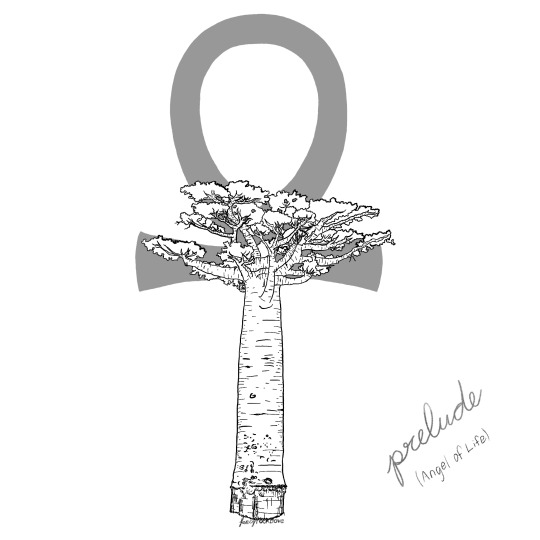
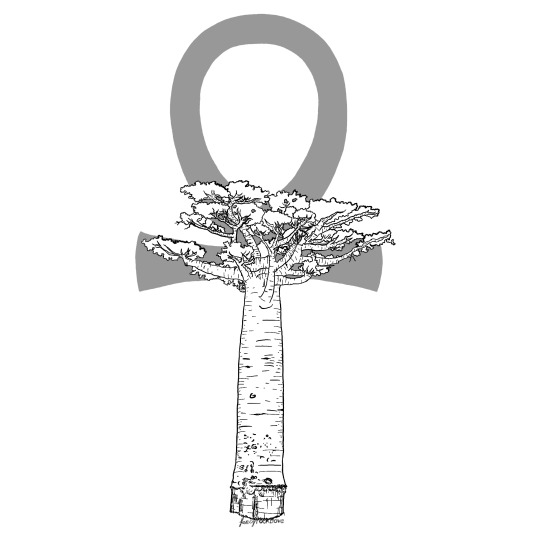
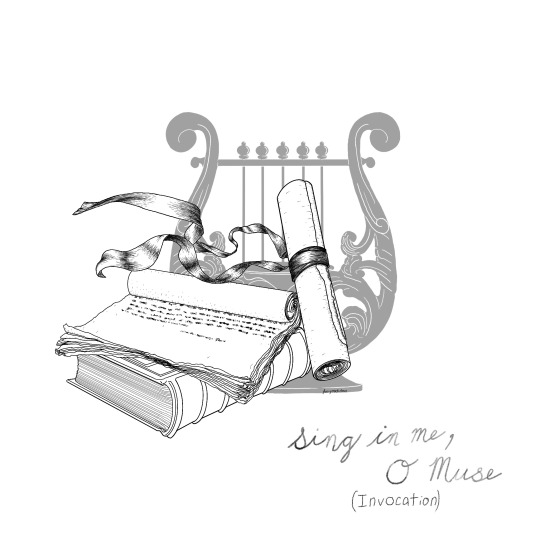





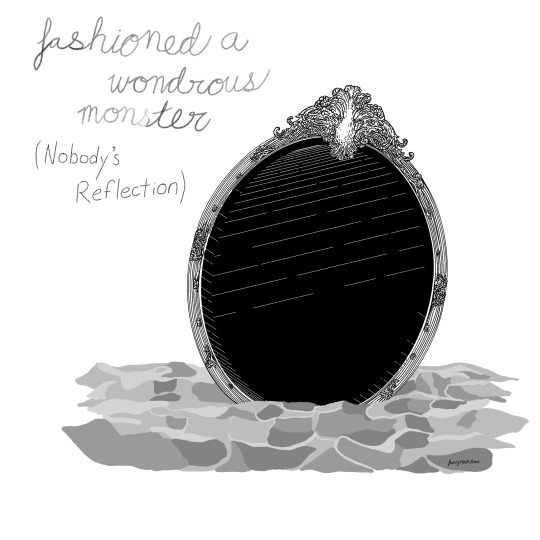
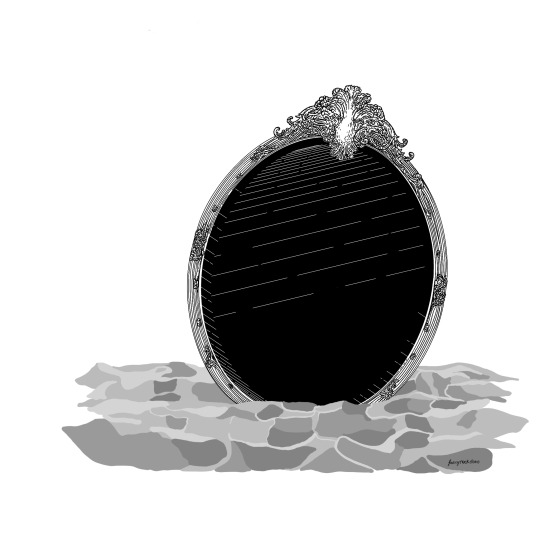
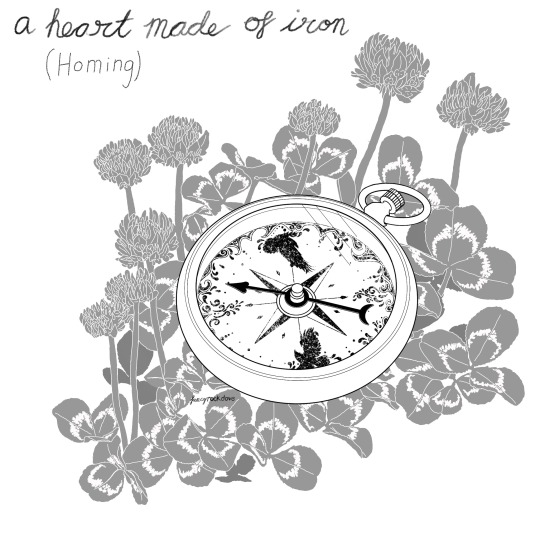

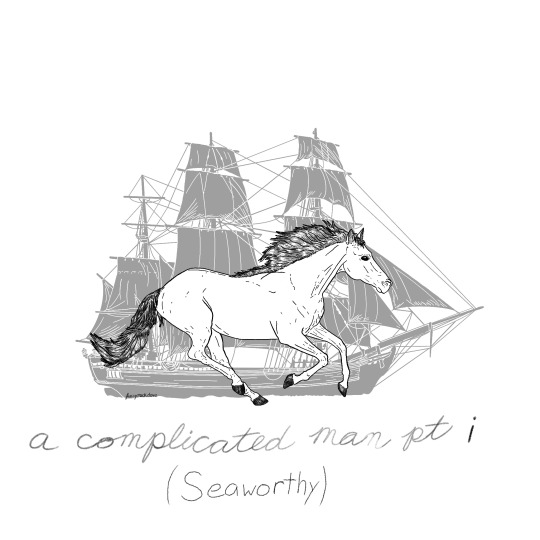




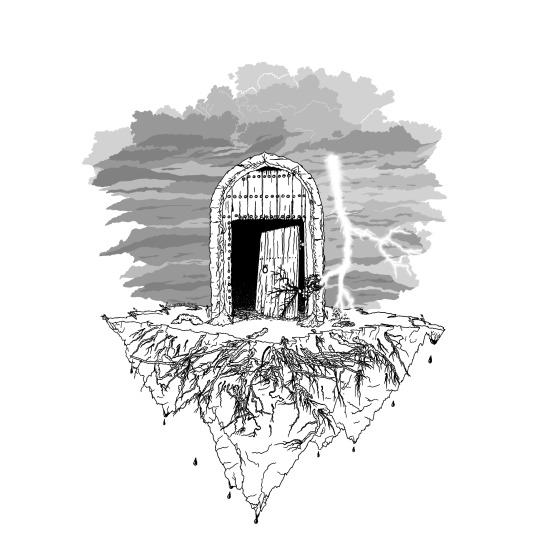
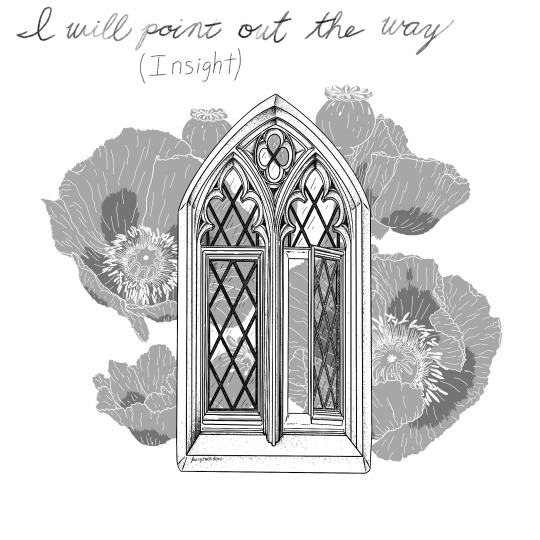


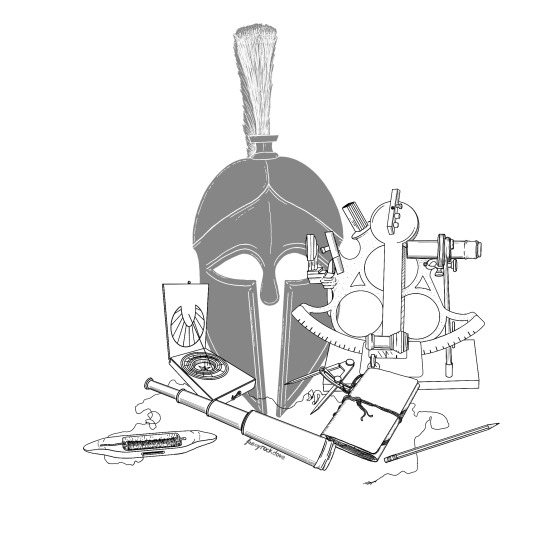
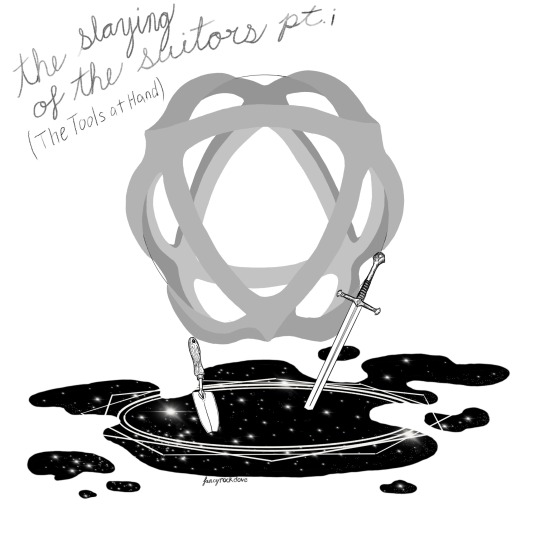

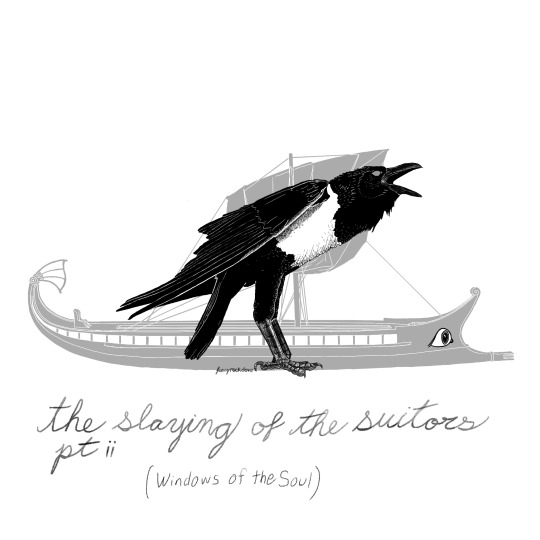
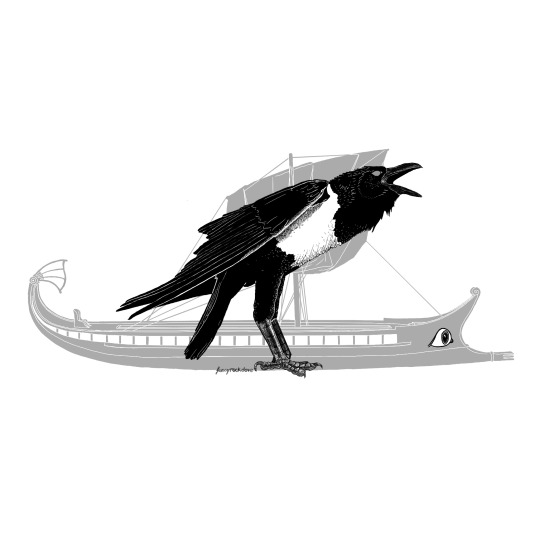
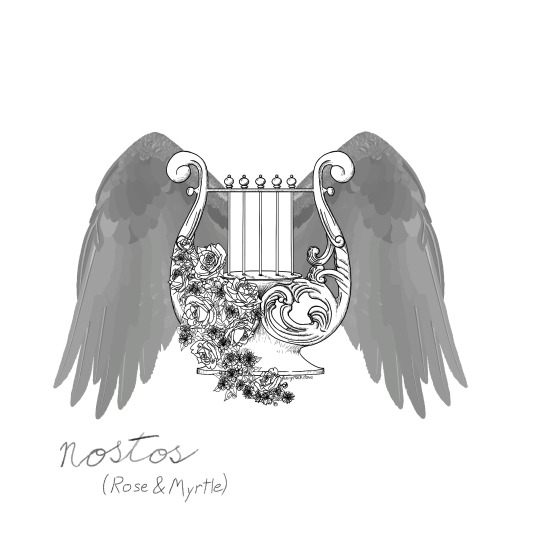
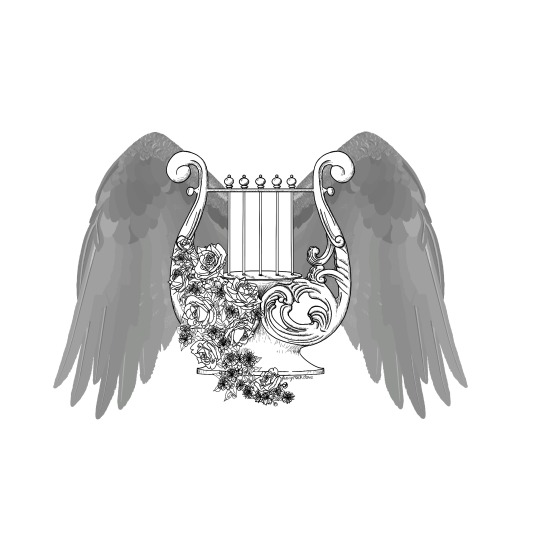
Ch 1: Baobabs are some of the oldest living flowering plants on the planet and can live up to two millennia. I have a lot of feelings about the sheer volume of life these trees can contain (both spatially and in time) and what that means for how we look at them.
Ch 2: If Abel were looking to avoid anachronism, he could still absolutely have left out books that were machine-printed with moveable type, but they'd probably have to have been in Chinese or Korean, from somewhere that had already widely adopted the technology by the 14th century.
Ch 3: Homer's works contain what is believed to be the first written mention of apples in Ancient Greece. Its writing is about as many centuries removed from the events of the Odyssey as the events of this chapter are from the first recorded mention of apples in England.
Ch 4: An ink quill is definitely more aesthetic, but graphite had actually been discovered in England and pencils invented in the decades prior to Shakespeare's first writings. It's entirely possible he could've been jotting down quick notes with a pencil like any stagehand today.
Ch 5: Though Corinthian style architecture is named for the Greek city of Corinth, with which it's associated, its inventor Callimachus is actually thought to be Athenian. The spiny, curling acanthus leaves used in its motifs are generally associated with long life, immortality, and rebirth. Go figure.
Ch 6: Symbolically, clovers are a sign that others are thinking of you. They're associated with good fortune, and apparently also male energy, and seen as a sign of protection. Excellent Fiddler's Green groundcover here.
Ch 7: Three-masted, fully-rigged ships became common in Europe by the 16th or 17th centuries during the Age of Sail because the extra space for sails became more necessary with the increase in open-ocean voyages. Making them the go-to type of vessel for both trade and exploration.
Ch 8: The simple but effective design of drop spindles is largely unchanged from their first documented use in the first century CE. there's evidence of their use for spinning (making a single, stronger thread from many disparate fibers) dating back at least to the advent of agriculture, some 10,000 years ago. Definitely what I picture Clotho using.
Ch 9: The fractal, branching structures of roots, lightning, and Lichtenberg figures are all self-similar: you can get much closer and they'll still appear very similar or identical to the way they were at a distance.
Ch 10: The throne room scenes of Sandman were shot in Guildford Cathedral. The Dreaming's Castle was intentionally designed to be a mashup of a whole ton of architectural styles, but the facade and throne room definitely feel gothic or neo-gothic. It's been a classic for centuries and the gothic-style window is definitely the kind I picture Hob's room having, at least on days the castle's feeling a bit fancy.
Ch 11: The item at the front left there is a weaving shuttle. According to Artemidorus, while dreaming of most kinds of looms indicates that you should expect rest, dreaming of a warp-weighted loom -- the kind which was common in bronze-age Greece and enables multiple people to work together on the weaving -- indicates an upcoming journey.
Ch 12: I feel like I've already talked about the symbolism of this one elsewhere, so for this one, instead of a fact, a comment (that I found fun): The binding circle in this only shows up in areas covered by the puddle of the Dreaming Sea, the means by which the nature of the "gilded ring" was elucidated. :)
Ch 13: Greek ships often had eyes on their bow, which among other things, was intended to imbue them with some will and ability to avoid obstacles. The Argo famously had eyes and also some innate awareness/intelligence, and could actually speak to the crew.
Ch 14: While Calliope, muse of epic poetry and eloquence (and the one invoked at the beginning of the Odyssey) is associated with a book, scroll, or tablet, Erato, muse of romantic poetry and love stories, is depicted in crowns of rose and myrtle. My title for this one was very nearly just (Invocation pt. ii). Also, I have a headcanon that Dream has only seen very bad performances of the Odysseyif ( he's seen any at all) since antiquity. Any show that literally begins by calling his ex is something he's not gonna stay for unless he's really sure she won't actually show up.
Whew! thanks to anyone who actually read to the end of my rambling here! Clearly this whole story has been really, really fun to just turn over in my mind. Cool stuff just keeps falling out of it! Since I would literally be two photos under Tumblr's limit on this post otherwise, how about a couple bonus alternate versions at the end here? Because why not?? I added some red accents to a couple of these for fun, and though it doesn't fit the for the chapter headings, I do think it looks cool!
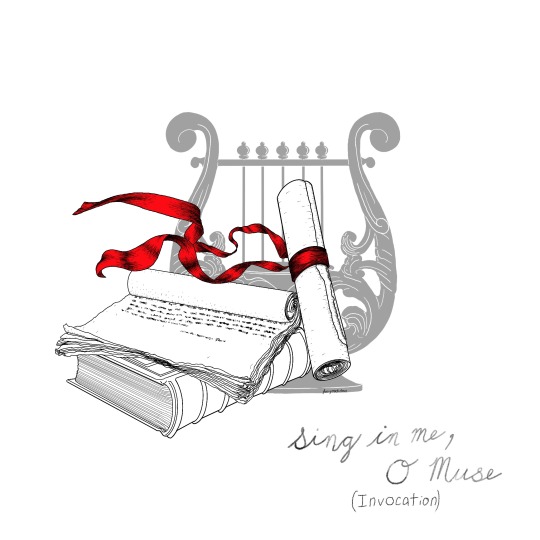
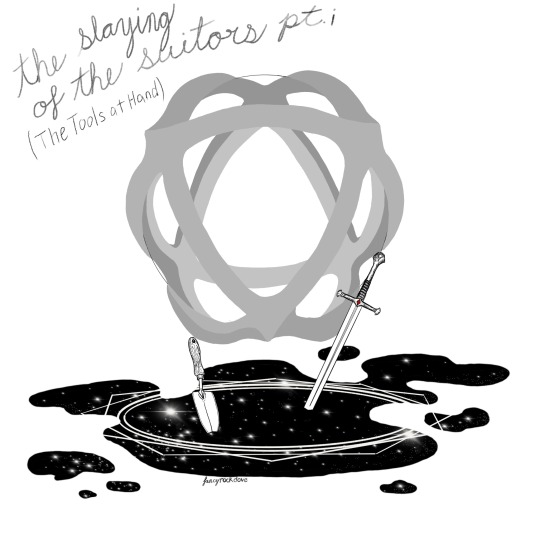
#Maybe Sprout Wings#fic rec#my art#the sandman#hob gadling#dream of the endless#long post#sorry?#how do I write art posts idk#dreamling
80 notes
·
View notes
Note
Hello! I really love your writing and with all the hype going with the mlp infection/zombie I was wondering how do you approach writing horror/gore? I mostly like to write slice of life, romantic, fluffy stories, so whenever I try to write something darker, a zombie apocalypse for example, the violence feels juvenile and the horror falls flat. Your stuff is absolutely terrifying and amazing, so I'm just sitting here wondering how?? I know that's a broad question, but I would appreciate a peek into your thought process for writing horror. Thank you and have a good day!!
Oh my gosh you're so kind!! First off, thank you! I have really enjoyed writing horror for this community for many years now, and it's been sorry cool to see this massive interest during of of nowhere for MLP horror content!
Second, definitely a broad question, but I can offer some broad tips in response:
(1) Work with what scares you. Horror actually comes naturally to most of us, you just have to be willing to explore some of the darker corners of yourself. Consume horror as much as possible and try not to shy away from what scares you. Most importantly, though, understand why you find it scary. This leads to step 2...
(2) Drill down to the core fear. There's a lot of creatures and things that pop up in horror again and again: ghosts, vampires, werewolves, and certainly zombies. But to work with these effectively we have to understand why they scare us. The answer is different for everyone! Let's take zombies as an example: for me, zombies are scary because they are infectious. I find plagues and diseases to be really really scary, even pre-covid lol. For others, it's more about loss of control - becoming a zombie means becoming an animal, or something else inhuman. Dig until you find the why. Then...
(3) Give someone the worst day possible. Picking your protagonist is critical. The monster has to be difficult for them to face! So think about what will play well off your core fear. If you've found zombies as your monster and distilled that to loss of control .. well, Luna would be a great choice! She's all about loss of control. That's super scary and very real for her. If you're going in more of an infectious disease direction, Twilight would make more sense - she would make a very believable germaphobe, yet still be driven to help those around her and find a cure. If you do it right, all you have to do is...
(4) Sit back and let it happen. It helps to have a destination in mind (even if it's as simple as "happy ending" or "real downer"), but if you've set yourself up this way you've got a concept and you're ready to let it rip. Start writing. Be gross. Scare yourself. Look over your shoulder and wonder who might be watching you. If you get stuck, ask yourself this: how could this possibly get any worse? Then do that. With pizzazz.
The details of writing prose that is gooey, gory, and chilling come from reading. You'll start to get a feel for where to linger, where to hold back, where to describe, and what to leave up to your reader's imagination. The hardest part is the balancing act - keep some things obscured. Leave some mystery while making it clear what is scary and why. However, once your audience knows the precise size and shape of what they're dealing with, it becomes a lot less scary! My rule of thumb is that I never want my audience to be able to plan a way around the danger. They should never be able to devise their own means of escape - something should always be left uncertain or shrouded in darkness.
I hope this helps!! If you'd ever like someone to look at what you're working on, I love beta-reading pony horror :) actually, come to think of it, I love beta-reading all horror!
Again, thank you! Your an earned my heart ❤️ I love hearing that my sacred are still scaring!
#im in quite a few mlp discords that are very interested in mlp horror also#so if you ever wanted to join a community like that im happy to share!#but since i dont own those discords im not willing to just post willy-nilly#idk maybe i should make an evil horse discord...#mlp#mlp horror#mlp fim horror#mlp fic#mlp fim fic#mlp fim horror fic#mlp fim#my little pony
11 notes
·
View notes
Text
Best Underrated Anime Group K Round 1: #K2 vs #K7
#K2: A show where any universe/plot is possible
The series is based on a manhua where the main characters are drawn as stick figures, so they can be placed in any situation, essentially making different AUs canon while any genre is possible. Some of these stories have overarching plots (they’re sort of like actors), some are more slice-of-life, and some have more hard-hitting moments of angst or occasionally cute, romantic stories between the leads: the mild-mannered Beryl (Green) and the easily-embarrassed Sapphire (Blue).
In this show where each episode is set in a different world, how would they encounter each other time and again?

#K7: A story of children who want to be acknowledged
Painted in red, the word "VON" is all that is left behind after a terrorist attack on a nuclear facility in Japan. The government is shattered by their inability to act, and the police are left frantically searching for ways to crack down the perpetrators. The public are clueless—until, six months later, a strange video makes its way onto the internet. In it, two teenage boys who identify themselves only as "Sphinx" directly challenge the police, threatening to cause destruction and mayhem across Tokyo. Unable to stop the mass panic quickly spreading through the city and desperate for any leads in their investigation, the police struggle to act effectively against these terrorists, with Detective Kenjirou Shibazaki caught in the middle of it all.
Titles, propagandas, trailers, and poll under the cut!

#K2: Beryl and Sapphire (Xiaolü He Xiaolan)
Propaganda:
It’s genuinely just such a cool concept! Getting to see these characters in practically any story/setting while still featuring the (usually same) main characters means you still get attached to the main cast, but you really get a diverse range of plots and ideas.
You may find yourself getting super attached to one (as I did for the Robo-Beryl arc, because I liked the character of Robo-Beryl but I also found Sapphire’s shyness/crushing adorable), and many of even the shortest ones are really interesting.
The OP even features them as actors and the title cards are film clapboards, which is such a cool way to tie in the main set-up!
Plus, because the manhua features them as stick figures, Ocarina (the original creator of Beryl and Sapphire) has way more room to explore deep ideas or just silly jokes; the flexibility of stick figures means we get lots of deep, philosophical writing/dialogue, and the donghua adapts that quite well.
Beryl is fun and Sapphire is super cute, and I love seeing how they interact in different universes/stories (and yes, they are very shippable!). Their default design is technically male, but sometimes they’re female too.
Some of the storylines are also super creative and really really do just punch you in the gut with feels. I don’t think I’ll ever forget some of the more tragic arcs…
Yet at the end of the day, Beryl and Sapphire is a really cute donghua, with a lot of feel-good stories to it! It even finally came back after like 4 years with season 2, which focuses on one of the over-arching arcs (the Demon King Beryl one), and we’re still getting discussions of deeper ideas alongside comedy, and Beryl and Sapphire are as cute as ever!
The new art style is quite pretty and hey, if you’re a fan of the playful, teasing (yet still can be rather emotionally reserved) type and the easily blushy type, Beryl and Sapphire may just be for you! 😉
Trigger Warnings: None.

#K7: Terror in Resonance (Zankyou no Terror)
youtube
Propaganda:
The big thing to this show is that the directors are Shinichirō Watanabe and Yoko Kanno, aka the team behind Cowboy Bebop. But in all seriousness, the show still haunts me and the music can still bring tears to my eyes. The art is incredible, and the characters are tragic. The story is partially about hope and largely about kids wanting their pain to be acknowledged.
Trigger Warnings: Child Abuse, Suicide

If you’re reblogging and adding your own propaganda, please tag me @best-underrated-anime so that I’ll be sure to see it.
#anime#donghua#best underrated anime#polls#poll tournament#tournament#anime tournament#animation#animated show#group stage#group stage round 1#tournament polls#group k#beryl and sapphire#xiao lu he xiao lan#xiaolu he xiaolan#terror in resonance#zankyou no terror#xiaolü he xiaolan
13 notes
·
View notes
Text
okay so I have one more ep left to watch of the Fallout tv series and while my opinion of the show has improved somewhat, I still think it's pretty mediocre.
I see a lot of people reeeaaally love Cooper, seen many people say he "steals the show," but he is easily my least favorite part of this series. Usually his character archetype is one I really like, but in Cooper's case he's missing a certain something. Not quite sure what it is yet. I also am really bothered by the new ghoul serum thing. The concept on it's own is fine I guess, but I can't help but wonder how this serum is being manufactured. What is it made out of? Who's manufacturing it? It seems like some ghouls need quite a lot of it to prevent themselves from going feral, but considering how persecuted and feared ghouls are I struggle to see WHO would be willing to do this besides a good samaritan or another ghoul. However, ep 4 seemed to suggest this whole serum business is a business. Like these two random humans just run this supposedly profitable business selling serum to ghouls, which is weird to me. I just don't buy that this would actually make them bank or be sustainable (literally see NO OTHER GHOULS until ep 4!?!?!). I will acknowledge this is something that won't bother someone who isn't a world building/lore obsessed pervert like myself. My questions may also be answered in the next season or whatever too, I'm simply not sure they will be able to provide an explanation I'll find satisfactory.
I also do not have much to say about Lucy or Maximus. Both of them had similar issues to Cooper for me. I see the foundation for good, fun characters, but they fall short of really sticking the landing. I like Lucy the most out of the three of them, I think. Part of what holds Maximus back for me does have to do with the BoS though. I am... not a fan of the direction they took in this show. They seem so interchangeable with every other like overly militaristic, power hungry faction in any other story that has one. They kinda remind me of ceasar's legion, but lacking the way they neatly fit into FONV's overarching themes (desire to return/inability to move on from an idyllic past). The BoS were interesting in Fallout 1 and New Vegas because they weren't just the obvious "bad guys" or whatever. They were kind of mysterious in Fallout 1 initially. They were a little weird, isolationist, and ultimately rather selfish and distrustful of humanity. While they were very effective fighters, they weren't really militaristic... atleast not from what I remember. They weren't "the good guys," but they weren't villains either. Regardless of what you, the player, felt about them they were at least interesting and memorable. The version we get from the TV series is so fucking passe imo. So forgettable, so unimaginative, and it naturally rubs off on Maximus. It makes him less interesting by extension. It would have been cool to see a version of Maximus that did grow up in a BoS more akin to what we see in Fallout 1 and New Vegas. It would give a point of commonality between Lucy and him as well. Both being out of touch with the wasteland due to their isolated upbringings, but in different ways/varying degrees.
Speaking of the wasteland, it feels so empty. Maybe "compartmentalized" is the better word, though, none of the locations we visit feel interconnected. Funnily enough, it feels very "video gamey," like we're going from one hub/level to the next rather than exploring a vast wasteland. I think this problem stands out for me so much because I am not particularly invested in any of the characters, and by extension the narrative, so everything surrounding them just becomes even more distracting. idk, this post is getting way too long. I have a lot of other thoughts I'll probably share later. Need to watch the last ep too.
#fallout#fallout tv series#saturn.txt#also yeah I know I call myself a ''lore pervert'' jokingly but I'm not like married to the lore. There's also a lot I'm forgetting I'm sure#I'm fine with the worldbuilding and lore diverging from the games (not like THOSE were ever consistent either) as long as they do something#interesting with it. I just think they failed to do that imo!#long post
5 notes
·
View notes
Note
I’ve seen your concept for Death Knight Yakou, and I am absolutely ecstatic to see how it will go! I am curious on a few things:
1. Will the Mystery Labyrinths Yakou encounter be the same as in the game, or will they be different this time? And will the other Detectives still be able to enter the Mystery Labyrinth, or nah?
2. Does Yuma still stay with Yakou on his sub, or does he get his own hotel room like the other Master Detectives? And how will their relationship be besides being sort-of memory loss buddies?
In regards to the overall mysteries and the culprits themselves, chapters 1-3 would remain pretty much the same. Chapter 0 and especially 4 is where it would get tricky. I obviously haven't gotten to reaching that stage of development to really hone in on the mysteries and the drastic changes of chapter 4, but I'm definitely leaning towards Yakou getting proper justice against Yomi. Perhaps Yomi decides to kill Huesca on his own (maybe even with Yakou unknowingly helping him in some form to keep with the underlying plot of the chapter), which is the once in a lifetime opportunity for Yakou is unravel the mystery of his wife's death alongside the current murder. It's as much of a work in progress as ya can get, but it's a start.
As for whether the buddy system of Yuma's story will be kept in a similar vein in this AU, I'm leaning towards yes. Yakou often utilizes Yuma to provide him assistance by using Coalescence to pass the power they're sharing from one source to the next. It definitely comes as a shock when the first assistant can still move as time freezes, completely unaware of Coalescence's side effect beforehand. Neither does Yuma know, so the little guy can't be blamed. Because of how much Yakou relies on Yuma, tension may arise from the strain on Coalescence.
2. Yuma sometimes stays overnight on the submarine, but there are nights where he'll switch spots with Vivia since the ghost detective hardly uses his room. His relationship with Yakou is rooted in a father-son dynamic, but kept open enough to the overarching idea of Yakou's overprotectiveness of his support system. With Yakou's need to stick close to Yuma, they grow to understand each other more, but at the same time, it puts an intense pressure on the small detective. He knows he needs to be of use, but having his Forte be put to its limit causes him great stress. Yakou walks a fine line of pursuing his own truths at the expense of others' wellbeing. Giving up the ability to take advantage of the powers he'll never have on his own, and instead rely on his own deduction skills he's honed over the years, is important to this AU. The themes of chapter 4 in the actual game are something I really want to explore and expand upon. Yakou doesn't need supernatural powers to be a good detective. What he really needs is the companionship of his found family to gift him the love he was missing for four years. Their support is his motivation.
16 notes
·
View notes
Note
apparently i dont have a candle emoji but candle for the fic ask game?
🕯️was there a fic that was really hard on you to write, or took you to a place you didn't think it would take you?
Well, I'm currently struggling with getting the last Giving Sanctuary chapter out so that has been "tough" - but with regards to GS, I will definitely say it took me places I didn't expect to go.
I really just expected it to be a bit of a hurt/comfort feel-good story, "What if Dream took Hob in when he needed it most?" I knew on a broader level I was intrigued by Hob and Dream both being fathers to sons who had died as young men, so that was sort of percolating at the back of my head too as something to explore that would bring them together.
But I was really surprised by a few things:
1 ) Just how much Dream and Hob clicked in the story. I was(/am) actively working on "This Rough Magic" and "Come live with me" - the former I actually took a break from because I was struggling to get Dream and Hob to connect on a romantic level. The latter, CLWM, starts from a place where they're physical together from the outset, but Dream doesn't really respect Hob from the start, not really. He still views the relationship as sort of "fuck buddies" at best and thought a physical relationship would be enough to make Hob put up with housing him for a year during the wager's run, not understanding how sincere Hob's love of him is, and how many other options he has in his life, and how effected Dream would be both by that love and by jealousy when he realizes Hob's love might not be guaranteed and that it could be a casualty of the wager. So they're close but they're building a lot of elements from scratch in the relationship, like respect and communication. CLWM Dream still hasn't told Hob about Orpheus.
In contrast, Giving Sanctuary starts from a place of mutual respect and communication (on every front except romantic or sexual love, where both of them are hesitant for a variety of reasons - though, to be fair, "hesitant" to the tune of one week of keeping it to themselves lol).
And I was really shocked at how quickly Hob's openness about how devastated he was by his son's death, and Dream opening up about Orpheus, just... brought them together. There was none of this uphill battle sense I had with my other fics. Dream wasn't holding himself back. He respected Hob from the outset. It was a greater effort to keep their hands off each other, the call of grief to grief just slipped so naturally past Dream's habitual armor on this front, it was truly dizzying and unexpected to write.
2 ) The extent to which the story became about grief. Now, of course when dealing with 1689 and their dead sons, grief was going to be a factor. But the level to which I was able to take 20 years of writing experience and thought and, I daresay, maturity and apply it to this story as a meditation on grief was very rewarding but also surprising for a fic that sort of began with the crack concept of, "What if Dream spirits Hob away to his realm as a result of one of their historic meetings, and what if it was 1689?"
3 ) The audience reaction to GS has been very gratifying. I'm an angst writer at heart, for all that I'm making an effort to write comedy and action more often. So this was a return to form for me and it seems to have resonated with a lot of people in a way I wasn't expecting!
20 notes
·
View notes
Text
Short Reflection: Vinland Saga Season 2
A sequel can do a lot of interesting things to the story it’s a part of. A great sequel can catapult an already good story into greatness. A bad sequel can squander whatever potential the first part was building up, or be so inconsequential that you can just pretend it doesn’t exist. But the hardest sequels to talk about are the ones that do an excellent job following up on what’s come before... yet still feel like a downgrade in ways so subtle you’re not quite sure if nostalgia is playing tricks on you or not. Did this series always have these flaws, you wonder, and you were just blind to them before? Or is something genuinely missing from this otherwise fantastic continuation that makes it feel less special than that initial entry? It’s a question I asked myself last year with the final season of Mob Psycho 100, a show that by any other metric would be a knockout success but couldn’t help but feel overshadowed by the seasons that came before. And now that same quandary presents itself to me with Vinland Saga, back after four years for another round of bloody historical viking combat and deep ruminations on the dangers of violence and hatred.
To make my position clear from the outset: I fucking love the first season of VInland Saga. It’s one of the best written, most achingly mature works of storytelling in anime, a beautiful exploration of the humanity behind violence, the people who perpetuate it and suffer it alike, and the complexities of people in a world far too willing to sort everyone into ally or enemy. It was potent, it was sincere, and it was achingly beautiful (at least when the production wasn’t driving itself into a ditch). It also had Askellad, one of my single favorite anime characters of all time for how beautifully he blurs the line between monster and hero. So perhaps that’s the reason why I don’t like season 2 as much; Askellad dies at the end of season 1 and only shows up here for a couple brief visions. My sweet baby gone too soon from this sinful world, we shall never see his like again.
I kid, I kid. Obviously, Askellad’s story ended exactly where it needed to, and any continuation to Vinland Saga- much like Thorfinn- would have to find a way forward without him. And that listless limbo of living between worlds is where we first meet Thorfinn as season 2 kicks off. Far from the ravenous warrior he was in season 1, Askellad’s death and the thwarting of his revenge has left him a shell of a man, barely able to function day by day. He’s ended up a slave on the farm of a seemingly kindly slavemaster named Ketil, his life reduced to following orders like an automaton as he wonders what the point of living even is now that his purpose has been taken away, leaving nothing but the memories of the countless lives he ripped apart in pursuit of it. But that begins to chance with the arrival of a new slave named Einar, a man who lost his home and family to Vikings much like the ones Thorfinn used to serve. As the two strike up an unlikely friendship, the shattered boy slowly begins to piece himself back together from nothing, facing the trauma he inflicted on others and himself and searching for new purpose unshackled from the bloodshed than once ruled his life. But it’s only a matter of time before bloodshed once again comes knocking at Thorfinn’s door, forcing him to come to terms with what kind of person he wants to be... and whether or not it’s possible to truly escape a world that seems to worship violence as the only true way.
It’s a radically different direction for the story to take, but it’s really the only way it could have gone. From the first episode, Vinland Saga has always been an interrogation of violence and its effect on people, a cry for peace in a world where that might as well be a foreign concept. And is season 1 was a full dive into the heart of that violence itself, season 2 is all about the escape from it, what it takes for a person who’s lived their whole life bathed in blood to seek a better way forward. Appropriately, most of what’s been dubbed “Farmland Saga” is spent on conversations and quiet moments, characters working out their issues and finding peace beyond the reach of a sword or ax. And whenever violence does show up, it’s always in short, brutal spurts of death where no one comes out happy, a far cry from the bombastic battles we used to have. And while that change no doubt rubs some fans the wrong way, it’s the only honest way Vinland Saga could continue to explore its themes. You can’t exactly tell a story of a man leaving violence behind and embracing peace if you’ve got limbs and heads flying at the same rate as season 1. Thorfinn’s growth from an emotionally stunted boy into a fully realized man, and the ways the rest of the inhabitants of Ketil’s farm react to the role of violence in their world, is Vinland Saga, and it’s still the same damn powerful story it was telling back when blood ran thicker and death same swifter.
So no, the relative absence of violence is not the reason that season 2 feels somewhat lacking in comparison to season 1. But then... what is the reason?
The obvious culprit to point at would be the change in studio. And yes, I’m as sick to death of the endless Wit vs Mappa debates as you are. So many stupid takes on every side, all ignoring the fundamental issue that both of these studios are infamous for treating their workers like shit and sacrificing healthy production times for the sake of pumping out more content for their shareholders to make money off of. Seriously, all your animation issues with shows from both of these studios come from the same source of corporate greed favorite quick profits over artistry, bond over that and fight your mutual enemy instead of turning it into a fandom dick measuring contest. That said, it’s not every day that you get to see two different studios put their own touches on multiple different anime in such clear terms. And between Attack on Titan and Vinland Saga, I definitely think there’s a conversation to be had on how Wit and Mappa’s approaches to anime differ... and what effect that has on the finished product.
To vastly, vastly oversimplify what I’ve observed, I’d say that Mappa tends to focus more on detailed animation, while Wit prioritizes cinematic direction. Whenever Mappa flexes its “budget” (yes I know that’s not really what it is I’m oversimplifying for time bear with me), it tends to be with intricate shots of richly detailed characters, every crease and line in their skin shaded and expressive. A single image or quick action cut, when given the time it needs, can feel so weighty and expressive, like you can actually reach out and touch it. Wit, meanwhile, tends to put its best foot forward with the way its camera brings its stories to life, sweeping CG-assisted tracking shots or gorgeous tableaus spilling out across the screen. They may sacrifice the finer details sometimes (and let’s be clear, there are moments where Vinland’s first season looks like aaaaaaass), but the visual imagination behind how they frame and present their anime captures that elusive feeling of cinema that few TV anime manage to achieve. Wit embraces anime not just as an animated medium, but a truly visual medium, one where every choice is make to sweep you up in the beauty this art form is capable of. And that’s a level of imagination, sadly, that Mappa doesn’t always measure up to.
In regards to Vinland specifically, the part of season 1 I always come back to is episode 14, which is framed almost entirely in claustrophobic, horrifying close-ups as we witness the slow-burn destruction our protagonists bring upon an innocent family. Everything is so close to your face, almost blotting out the frame, shoving your face in the horrors the story’s main characters are capable of committing and refusing to let you turn your gaze away. It’s one of the most gut-wrenching episodes of anime I’ve ever experienced, and it’s all thanks to how thoroughly Wit embraced the tools of this medium to drive home that horror. Moments like that are what made Vinland’s first season such a cinematic marvel, even when the production was clearly suffering from poor time management. By contrast, most of the big experimental moments from season 2- dreams, nightmares, near-death experiences, visions- are shot and framed rather conventionally. In fact, pretty much every scene in season 2 has the most basic “camerawork” imaginable. Mid shots and long shots and close-ups and detailed action cuts, all in their proper places, yes, but there are no moments like episode 14, no moments where the visual language rises to that same level of brilliance. It’s all individual moments of beautiful animation (and some rough patches as well because again, Mappa and Wit have the same problems with overwork affecting the final product) with nothing that truly takes flight and shows off the true power of the medium as an artistic form. Still achingly effective thanks to the strength of the writing, performances and soundtrack, but if anyone at Mappa has the same sense of cinematic joy and creativity as the folks at Wit, well, they were probably working on Chainsaw Man while Vinland season 2 was in production.
But technical differences can only explain so much. Attack on Titan also had a rough start switching to Mappa, and it still managed to be pretty much as electrifying and incredible as always. Which means we need to dig a little deeper in the writing of season 2 and figure out what isn’t clicking quite as well this time around. And thankfully, the answer is actually pretty obvious, so I’m gonna come right out with it: the dialogue in season 2 kinda sucks.
See, telling a slow-burn story that’s mostly conversation is a totally fine way to explore your themes, even if the actual plot remains fairly still for the sake of intricate character work. But there is an art to writing a slow burn without making audiences long for something faster-paced, and it is not an art that season 2 pulls off well. Almost every conversation boils down to characters talking explicitly about the show’s themes for minutes on end, repeated and re-repeating themselves as they endlessly ruminate on violence, peace, the nature of war, the nature of hatred, trauma, forgiveness, moving forward and choosing the hard way over the easy way until they all start bleeding together into the same indistinguishable soup. These conversations don’t feel like people engaging with heady ideas, they feel like the author was terrified of even a single audience member not getting the point. There are some really powerful themes season 2 is working with, but they start to feel less special when every episode is full to bursting with characters doing nothing but talking about those themes for the hundredth time.
And just to make sure, I re-watched an episode of season 1, and it didn’t have this problem! The dialogue in season 1 flows so much more naturally, characters seamlessly weaving between plot-relevant exposition and interpersonal relationship-building and interesting, quirky asides and heavy, climactic confrontations. Perhaps it helps that season 1 also has a lot more moving pieces, so it has countless ideas it can juggle throughout a single episode without getting bogged down in a single mode for too long. The occasional thematically explicit speech or monologue becomes a lot more powerful when used sparingly, interspersed with other story beats that advance the story and its themes through less direct methods. “Show, don’t tell” is a common piece of writing advice for a reason; most of us find stories’ ideas far more engaging when they’re revealed through characters actions rather than (or at least in addition to) their words. But with so few actions to “show” throughout season 2, pretty much all of its thematic weight relies on characters “telling” us what we should think about the experiences they’re going through. Thorfinn tells Einar about his trauma, Einar tells Thorfinn about his perspective on life, Canute tells his weird ghost dad head (which, I’m sorry, this thing just looks goofy) about his increasing moral rot and the weight of the king’s crown, and all of it really starts to drag when there’s nothing else to change things up. No wonder some fans grew tired and started to beg for a return to the bloody action.
Which I seriously want to drive home: Vinland Saga season 2 not being violent is not its problem. This show has always been a plea for peace, so exploring the aftereffects of escaping a violent life in a mostly peaceful environment for Thorfinn to find himself again is exactly the direction it should have gone in. And in the moments where stuff actually happens in season 2? Where the endless slow-burning conversations give way to action, violent or otherwise, on part of its characters? It’s just as heartbreaking and awe-inspiring as anything in season 1. The only reason I’ve gone so hard on critiquing this season is because I know just how fucking fantastic this show can be at its best, and when season 2 is at its best, it absolutely lives up to that high bar and more. Going peaceful isn’t the problem; the problem is that it just isn’t as good at being a peaceful story as it is a violent war story. Not bad at it, just not as good. Vinland Saga’s first season explored its themes so well by balancing so many different factors and making them all sing in harmony, delivering a propulsive tale of blood and swords that drove its ideas into you like knives while still being an entertaining story capable of effectively delivering those themes in the first place. Season 2, meanwhile, puts almost all of its eggs in a single basket, and suddenly it finds itself running into problems it can’t fix without betraying the core of its narrative. It’s like trying to build the same house twice but the second time you only have 10% of your toolbelt available; the fact it even ended up as great as it did is something of a minor miracle.
And make no mistake: Vinland Saga season 2 is still great. For as much as I’ve complained about it, it’s every bit the change in direction this story needed to carry forward. And while the execution wasn’t perfect, it was still able to lay me out on the floor like few shows even come close to. Vinland Saga is a colossus. Vinland Saga matters. It’s so rare we get stories this mature, this thoughtful, and this widely beloved in this crazy medium we call home. And if Mappa’s planning to stick with this one until the end like Attack on Titan, I hope, much like that show, future installments are able to find their footing and push it back to the top of the heap where it belongs. Until then, I give season a score of:
8/10
And so begins the Spring 2023 round-up. Look forward for more seasonal reflections to come!
10 notes
·
View notes
Note
Do you think the writers made Amity "perfect" by accident? Not perfect but decent enough, I was thinking maybe that's why they didn't put much focus on Willow and Gus because they don't know how to? Or were just unaware of the fandom's interest in these characters and thought we don't care
They put more focus on Hunter tho, but he's all over the place.
Maybe it's because Amity was written with a end goal/end result in mind, to be paired with Luz so they knew how to start her characterisation and arc? I guess (also why she gets nothing after that's done)
With Gus and Willow it's like they were written to be nothing besides background characters, first intent before fandom pressure
Hunter is basically Amity if she had like, more end goals or more arcs in mind but you don't know which one to chose, (looks like they tried to write them all in). It's like the opposite of Willow and Gus but with the same result, not knowing what to do with them.
Somehow she's solid enough to still attract attention even by doing trivial stuff. Still indulging even if it's just her being clumsy or rambling about a student council. It's a charisma that I don't see in others characters (except Lilith and Boscha but that's a personal thing for me not general)
It took me a couple reads to understand what you meant by perfect to realize you meant as far as narrative potential goes and in that regard...
She's not perfect. She goes well with the high concept fantasy idea as someone who has directly profited from Belos and conforms to his system and the school ideas because... Obvious reasons quite frankly but one half of this is never acknowledged. Not only that but she doesn't fit well with wacky hi-jinks because she'd always need a purpose behind her actions (at least in Season 1). She's effectively too logical so forcing her into a situation can be awkward.
As for if it were intentional, I don't entirely think so. Dana had an interview recently that illuminated how much the romantic interests in the show for Luz and Eda were explicitly for the sake of being romantic interests. That one was because they wanted an old flame for Eda and the other was so they could quickly get a casual, gay relationship in before anyone could stop them. That's me closely quoting the brief interview.
And Amity's potential, and then waste of it, reflects the role of being made to allow for a fast, LGBT relationship. So much of her angst and 'problems' are things that contrast with Luz in a way that, if you don't actually care about them, can be bulldozed through with enough meaning to give a plus one to their relationship each time more of Amity is fixed. They are also all setup in ways that fit well to Luz's talents or by the basic premise of 'friendship and kindness are good'.
This is also why so much of it is discarded and sheered off so quickly. Why things like Willow are pushed away so quickly for the sake of the romance because while S1 was a bit more subtle about it, there's still the line in S2 of "I do stupid things around you." Which... Would ring more true if she felt like she did illogical things before Looking Glass but she really doesn't. Maybe a touch distracted but there's always a rhyme and a reason behind what she did until that episode.
In that sense, Lumity could be said to be rushed actually. Not that I think it is but there's a case to be had that realistically, if we were to treat Amity as a more full character, it should have taken longer. There should have been more in the way. Amity 'acting silly' shouldn't have been the only fear she had about them getting together.
Which I'm going to genuinely plug Rich Witch here. A large part of why Rich Witch was made was that while I explore a LOT of Amity's potential in The Power of Love, my story started between seasons, it still started with them only one step away from getting together. Worries like what being friends with Luz meant, what ditching her friends meant to her parents, and somewhat to them, etc. like that were harder to cover in that story.
So I wanted a clean slate. If Amity actually had a reason to be against Luz, what does it take to get them together? How bad of a friend was Amity before Luz came around? How much of this was self inflicted and how much of it was outside forces? And how did the process of getting close go if the story were more focused on the romance and Amity?
Those were essentially the fundamental questions that led to me making Rich Witch which I do wish to continue someday. Just... Well, Amazon did its own platform dirty and made failure pretty much the fate of all but the already wealthy and influential and that has done bad things to me about it. *sigh*
Sorry I mostly focused on the beginning of the ask btw. Hunter got more attention because he's plot relevant, Gus and Willow lost attention because quite frankly they're just there to help facilitate Hexide things and thus Amity so once Amity was a bigger deal, they were shoved to the side (until then used to help Hunter's character). And Amity is pretty, nice and has a very good VA so her having a lot of charisma with the show, which will pause for ten seconds to just spend time making her look good (when she picks up random abomination goo in Special 2) so it's not surprising she has more charisma than other characters. She was the favorite for a reason and few will abandon their favorites quickly.
11 notes
·
View notes
Text
Five times The Orville did the same story better than in Star Trek
The Orville obviously borrows a lot from Star Trek, which is being generous, and not just themes and ideas, it's lifted entire ideas for episodes for the series. It does have its fair share of more original episodes too, but its at times just flat out remade Star Trek episodes. Which is fine with me. Sometimes it has done this in an inferior manner (Mad Idolatry for example, while visually impressive and on its own a good episode, was still an inferior version of Who Watches The Watchers imo), but in these cases, The Orville actually did them better:
1.) If the Stars Should Appear - For The World Is Hollow And I Have Touched The Sky
Episode 4 of the first season of The Orville is about the crew finding a massive generational starship which is headed for a star, and contains a population unaware that it is on a spaceship, ruled by an authoritarian theocracy. Sounds familiar, right? Yep, this is a remake of that famous TOS episode about a generational spaceship carved into an asteroid with a population unaware it's in space, ruled by an oppressive religious system (of course). While certainly not the worst TOS episode, the original episode suffers from many problems of TOS in being rather hokey and not having the special effects to really realize the concept, given it was made for TV in the mid 60s. The Orville episode, while also not perfect, suffering from the problems all the episodes of the first season suffer from (mainly the problem of immersion breaking jokes inserted in to make the episode unnecessarily more comedic), is better both visually and story wise. When not trying in vain to be funny, the episode works very well as a remake of the original premise with the actual budget to make it work and even has a cool ending featuring Liam Neeson.
2.) Deflectors - The Outcast
Old Trek really dropped the ball on LGBTQ representation and promotion, having very few instances where one can claim it was progressive on this issue. The Orville on the other hand, is far more bold and progressive on this issue. "Deflectors" is a case in point, a clear allegory on gay rights and gay acceptance. However, the episode is essentially a remake of the TNG episode "The Outcast". In that episode, the TNG crew meet an androgynous alien race who are against all gender expression and repress it. Sounds like a trans rights allegory, right? Well, strangely no, the episode was intended as a gay rights allegory but along the way, the message became so muddled that the episode accidentally comes off as a trans allegory afraid of promoting gay rights (the character Riker falls in love with was originally meant to be played by a male, with a gay kissing scene even). Kinda funny. The Orville takes a similar idea, the Moclan species which suppresses all expression of the female gender also represses any instances of heterosexuality, an obvious flipped allegory on societies attitudes toward homosexuality. Beyond just being actually clear in its message, the episode is visually and even acting wise far better, with a more interesting mystery plot woven in and a sad ending that impacts more than the ending in "The Outcast".
3.) A Tale Of Two Topas - The Outcast
Okay I guess I'm cheating by covering the same Trek episode twice, but "The Outcast" is indeed far better as a trans allegory than a gay rights allegory. But The Orville did a trans allegory far better too. "A Tale Of Two Topas" actually directly addresses the issues of children with gender dysphoria, exploring their emotions, the (lack of) acceptance of their condition and identity, and how this can lead them to suicidal ideation and other self-destructive behavior. The episode is fantastic as a trans allegory primarily because it doesn't actually shy away from the message, and it's definitely an episode needed in this day and age. Far better than "The Outcast" which comes off as an episode of Riker trying to save a woman he wants to bone from an evil non-binary society. "A Tale Of Two Topas", much like "Deflectors", feels like the LGBTQ episode TNG or one of the other 90s/early 2000s Treks should have produced to be a trailblazer but never did for whatever reason (which will be the subject of a future post). Of course because it's an allegory, some people, namely conservative fans, didn't get it and actually interpreted as an anti-trans episode, which led Seth Macfarlane and others on the show to have to tell them otherwise, amusingly enough.
4.) From Unknown Graves - Angel One
Okay, this one is a tiny bit of a stretch, because the plots are very different, however the theme is similar. The Orville has to try to make an alliance with a fiercely matriarchal species whose society discriminates against males. Yeah, sound familiar? It's a bit like "Angel One" albeit with a different overall plot, in fact this plot is only the B plot of the episode. I still wanted to include it in because it deals with the idea of a matriarchal society far better than the cheesy and bizarre "Angel One" which btw was apparently meant to be an allegory for South African apartheid? I don't get it either. Instead of having a man seduce the evil sexist woman and changing her mind, The Orville actually takes the idea more seriously despite also mixing in a lot of comedy which works because it's actually not immersion breaking. As for its A plot, not related but surprisingly does things better than Trek did too, and I might as well mention it here briefly. The scene of Issac getting emotions and being overwhelmed by them is somehow better than when Data got emotions in Generations, and it showed how good The Orville be.
5.) Electric Sheep - Eye Of The Beholder
Again, a bit of a stretch because the overall plots are different, but they both deal with the same theme: suicide. TNG's "Eye Of The Beholder" has some interesting discussions on suicide, but it devolves into a bizarre murder mystery plot that doesn't really work. The Orville's "Electric Sheep" covers the topic better by making the attempted suicide of Issac as a central point of the plot without devolving into trying to be something more exciting. The reactions and responses to suicide are just done much better in The Orville, even if it has a somewhat trite cop-out with Issac being saved in the end by technobabble. The scenes of the young Ty trying to recreate Issac in the holdeck..er I mean simulator are just another example of how much better this episode is. Overall, surprisingly The Orville covers the subject in a more adult and serious manner and this solidifies The Orville as a good remake of TNG.
6 notes
·
View notes
Text
Kingdom Hearts Review
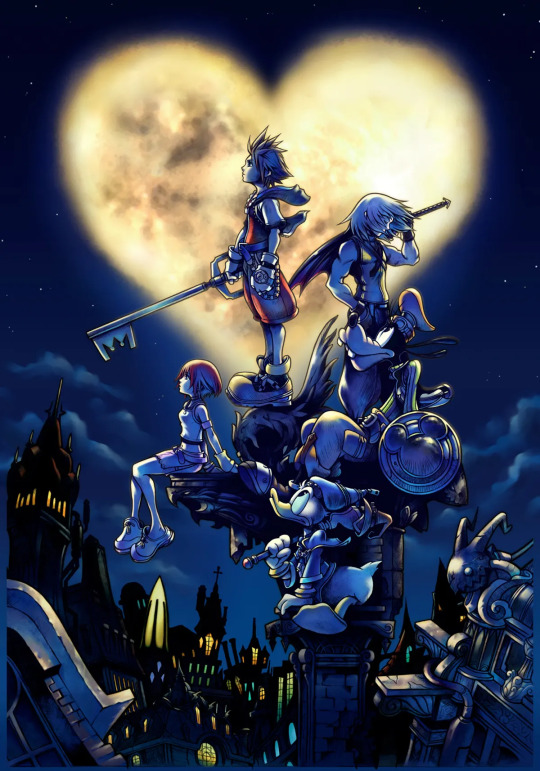
After long last I am back with another review! This time with a review of Kingdom Hearts 1! Kingdom hearts is one hell of a large series. the game back in the day was marketed as a Crossover between Final Fantasy and Disney. An odd mix to be sure, but it sure intrigued my Disney loving, Final Fantasy loving ass as a kid. I remember playing this game over and over again as a kid. That is to say that I'll be honest that while I will attempt to be critical of it, I am not perfect and I am sure bias will peek through.
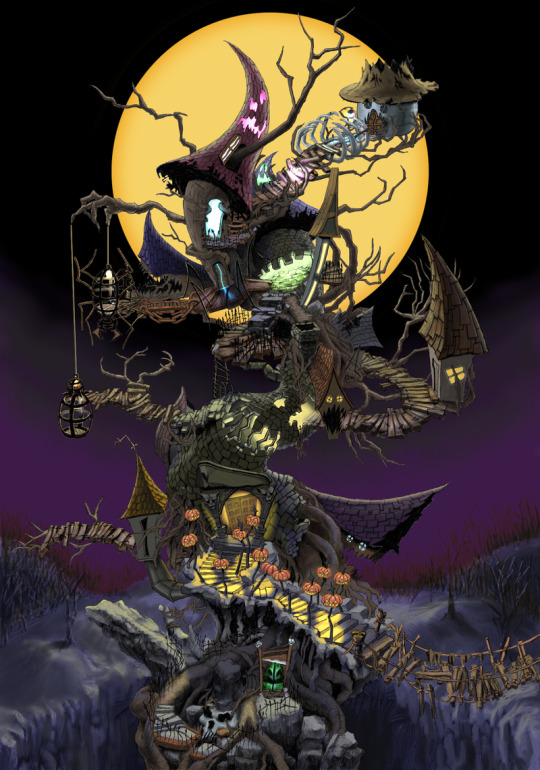
Gameplay: The gameplay of KH1 is definitely not as good as KH2 or 3. That's not that controversial to say of course. The series WILL get better over time as they explore and expand the gameplay. That said the gameplay is definitely good. The game is a simple action adventure rpg. It has elements of a platformer here and then but mostly just action adventure, with a heaping helping of hack and slash. The gameplay is pretty simple and even on the hardest difficulty isn't hard to understand or get over. I'll say the biggest criticism I have is of the game having such drastic effects on the game such as how fast you level or what moves you learn at all being behind quiz answers and such that at the time you'd never know and even now only if you do research is a very bad idea. It makes the game very annoying and punishing for those that want to go in blind. That is a VERY bad idea that I do not like at all. But IF you have help with that, then you are golden. The game is good, not great, gameplay wise.
Sound: The music in most of the levels is simple. Lots of KH music in the Disney levels are kind of mindless. Mostly just ideas taken straight out of the movies the levels are based on. Halloween town has the "This is Halloween" for example as the easiest choice of "yeah that's what I expected" choices. That said in THIS game most of the songs are BASED on the movies and not actually just the straight songs. But the music is still very much BASED on the music there and blends in a lot in my opinion. Tarzan and Peter Pan being the best levels in the game for music in my opinion. I think the music while very much of the movie it is based on is still rather nice. That said the big stand outs are the songs made for the original levels. Hollow Bastion's level having the best in the game to me as the music is intense and grand. It fits the concept of this being Maleficent's castle. This is where the greatest evils in Disney and the KH universe as a whole call home! It also makes you feel like "Yeah, I hit the final stretch of the game. Things are moving to the finish line now!" For that and much more the game's music STILL is something I'd consider good. Just don't expect top tier music from the Disney levels.
Story & Characters: We've reached the category that non KH fans dread: The STORY! So allow me to explain the complicated plot. A kid gets a giant key weapon. The kid fights Disney and FF characters with Donald Duck and Goofy to help his friends and saves the world from a guy who wants to conquer all worlds. Like I could go into unnecessary detail on the plot to make it seem more complicated but it really isn't that complicated. The worst of it is that the keyblade weapon Sora, our protagonist, uses sort of has a mind of its own. But that's sorta common for magic weapons in fantasy media. Really KH1 is very accessible for newcomers (obviously). You wanna play KH1? Don't do chronological order, just start here. The story overall is good, well written and hits the right beats. The Disney levels mostly are original plots that service the overall story too. So yeah, overall good.
Extra Segment, Is it worth it?: Why this segment? Because I played this game on the HARDEST difficulty after being bullied to do so. Now I wish to truly show my thoughts on Proud difficulty. Is it worth playing? No, not really. Like, it's not THAT hard. But not really worth it either. Just play it if normal difficulty is too easy for you. So yeah, no, I don't think it's worth it. I'll probably play on normal mode if I go back to it again. That way I can relax and not die over and over again. Don't get me wrong though I did nearly everything in this game on hardest difficulty. Only didn't do the synthesis and Gummi missions.
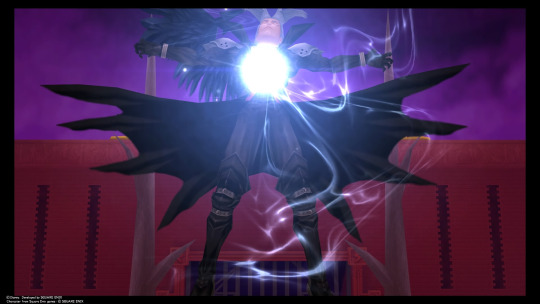
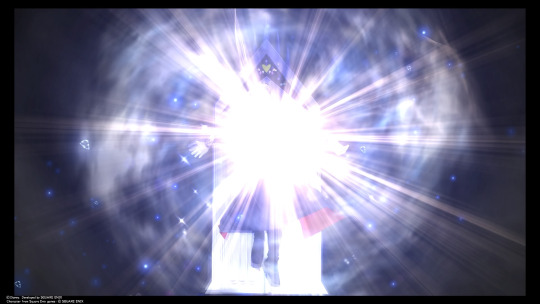
Final Thoughts: Kingdom Hearts 1 is a whimsical game that is easy to see how it became such a big thing that Sora being in Smash was the most requested character ever. It's fun and actiony and has a little something for everyone. I don't have much left to add except yeah, if ANY of these things intrigue you, go give it a shot. The game is dirt cheap nowadays.
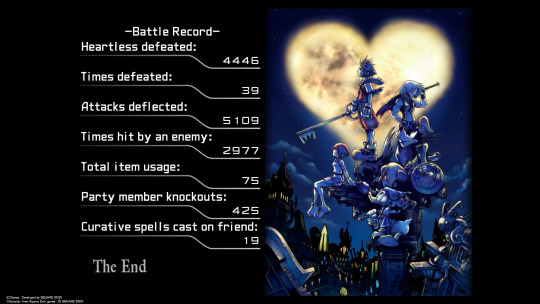
8 notes
·
View notes
Note
So what were your thoughts on the Teal Mask DLC?
Ooh I have a lot to say so apologies in advance for the post length! (I’m gonna put this under a “keep reading” because it’s long and it has spoilers!)
I thought the Teal Mask was great! I had a lot of fun playing through the story and running around exploring Kitakami. I spent the majority of my first session just exploring and catching pokemon lol
The story was really good! I had a feeling that the Loyal Three were shady individuals, so it didn’t really surprise me when they were revealed to be the true villains. I also had a feeling I would end up loving ogerpon, which also came true! I love everything about her. Her smile, her eyes, the way she just stands there and does a little shimmy. She’s perfect.
I also really like the new characters! I started out hating Carmine, but ended up liking her a lot by the end (I’m sure that’s what they were going for, but I was still surprised). Kieran sort of had the opposite effect on me. I started out liking him a lot, but by the end, I was really starting to question things. I don't dislike him at all though, he's a really interesting character! That part with him at the end before the “to be continued” was so ominous…
The side quest in the Timeless Woods was super cool too! I got really excited when I heard Legends Arceus music. I also wasn’t expecting a new form for a Hisuian pokemon! I’ve never been a fan of ursaluna but the blood moon form is a neat idea!
And last but not least, here’s my personal ranking for all of the new pokemon, with 1 being my least favorite and 10 being my favorite!
Dipplin - 5 / 10. I like the concept, but I’m pretty indifferent towards it overall.
Poltchageist - 6 / 10. I think it’s cute! I really like the trailer they made for it.
Sinistcha - 9 / 10. I love this guy! I used one on my team and it’s great! I’m obsessed with the fact that its “hat” is a chasen.
Okidogi - 3 / 10. The design is okay, I’m just not really into the colors. He’s pretty goofy though so I can’t bring myself to hate him.
Munkidori - 1 / 10. Yeah, this design isn’t for me lol. I’ve seen other artists draw him with better proportions though and I think those look much better!
Fezandipiti - 3 / 10. Pretty much the same opinion as Okidogi.
Ogerpon - 10 / 10! She’s my precious baby and I would literally do anything for her.
Blood Moon Ursaluna - 5 / 10. Again, a very cool concept! I’m just kinda indifferent.
Overall, I'd give the Teal Mask a 9.5 / 10! I only wish that there was a little bit more to do after the story (and I also wish they'd let me transfer Marshadow into the game asjfsdkgs)
#thanks for asking!#teal mask spoilers#I haven't done everything quite yet#but I beat the main story + the timeless woods stuff!#also I've done a couple shiny hunts!#though not for any of the new / returning 'mons yet#so far I have a houndour growlithe and gengar!#I've got some headcanon ideas I need to write down...
4 notes
·
View notes